
Monday, October 31, 2005
Wednesday, October 26, 2005
Middle of the Road
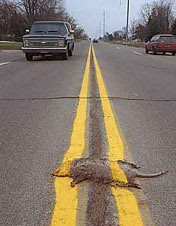 Several months back I listened to an NPR interview by Terry Gross of Ari Fleischer, our President's first press secretary. Mr. Fleischer was pleasant enough to listen to and after fifteen minutes or so I found myself thinking he probably was a bit too smooth, but maybe not a such bad chap.
Several months back I listened to an NPR interview by Terry Gross of Ari Fleischer, our President's first press secretary. Mr. Fleischer was pleasant enough to listen to and after fifteen minutes or so I found myself thinking he probably was a bit too smooth, but maybe not a such bad chap.But as the interview continued I began to develop a strange disquiet that lasted through the end. I began to notice that Mr. Fleischer kept referring to the Left and the Right, Liberal and Conservative, when discussing political issues. I started to listen for any reference to the Middle. But it was as if the Middle did not exist. I began to wonder what ever happened to our citizens in the Middle. We used to have a Moderates in this country. Really.
There was a time in our recent past when it was OK to be a Moderate, center-of-the-road. Both political parties had Left and Right wings, nuts they were often called. Moderates from both parties listened to the more extreme views of their brethren - the ideologically torqued up - and then supported programs and policies that found common ground. They usually carried the day and we muddled through.
Those who looked for their thrills close to either edge were very often bright, committed and attractive. But they were understood as being quite dangerous if allowed to take center stage. Both Hitler and Stalin and the Weathermen and J. Edgar Hoover had more in common than they would care to admit. They serve as a caution to us all.
But things have changed. With a stridency seen but very occasionally in our short history, Americans are now being pulled - or pushed - to one side or another. Everyone seems to have talking point, not ideas. We are citizens of Red States or Blue States, like it or not. Our fourth estate, the eyes and ears of democracy, are now mainly seen as shills for one side or another - as if every issues just has two sides! Politics is now a blood sport, with the line between political dialogue and entertainment fading fast. Liberals v. Lions at 4:30. Conservatives v. Lions at 5. We now have a whole generation who have seen nothing else. They think this is normal. We may debate as to how we got this way, or whether is it a good or bad thing, but here we are.
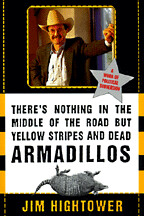 Jim Hightower, the self-proclaimed America's #1 populist, has scorned those seeking the middle of the road. He wants us to commit to one side of the other, believing of course that most will join him. He reminds us that the most dangerous place to be now is in the middle of the road, the new ragged edge of American politics.
Jim Hightower, the self-proclaimed America's #1 populist, has scorned those seeking the middle of the road. He wants us to commit to one side of the other, believing of course that most will join him. He reminds us that the most dangerous place to be now is in the middle of the road, the new ragged edge of American politics.Push come to shove I know which side of the barricade I would join. That part is easy for me. But for the time being I would rather get my thrills searching for that center again. It wasn't so bad.
Sunday, October 23, 2005
Wheeee!
Yesterday the 3 PM temperature at the local airport was 81 degrees (F). This morning at 7 AM it was 43 (F), a 38 degree drop in sixteen hours.
I think autumn just knocked on the door.
I think autumn just knocked on the door.
Saturday, October 22, 2005
More Railroad Earth
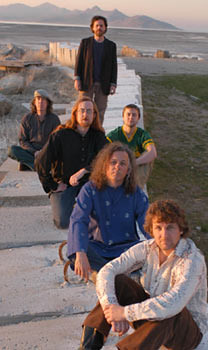 Last Saturday evening was the fourth and last of our string of live music week-ends. For the third time we were in Charlotte at the Neighborhood Theatre, this time spending an evening with Railroad Earth. My daughter, her fiancee Michael and her old friend Chuck joined us, first for a wonderful dinner at Boudreaux's and then for the music. The evening was just about perfect. But the best part for me was after the show, in the parking lot.
Last Saturday evening was the fourth and last of our string of live music week-ends. For the third time we were in Charlotte at the Neighborhood Theatre, this time spending an evening with Railroad Earth. My daughter, her fiancee Michael and her old friend Chuck joined us, first for a wonderful dinner at Boudreaux's and then for the music. The evening was just about perfect. But the best part for me was after the show, in the parking lot.Railroad Earth filled the main stage of the theatre nicely and opened at about a quarter to nine. Our seats were about four rows back, center. The sound was perfect as was the sightline to the stage. The dancers in front of the stage did not obscure our view. As there was no opening band, RRE played two sets. After the first my wife and I staked out a position at the foot of the stage with the dancers where we spend the remainder of the evening.
The guys came back after the break and just smoked. As it was their eighth show in nine days, I was amazed at their energy level. I was stationed underneath John Skehan, the mandolin player. From this position I was able to hear the music partially through his stage monitor - all the better to marvel at his contribution to the band's sound. I don't think I have ever heard the band any better. I sure hope a copy of the show appears on archive.org.
After the show - three encores - we said our good-byes and headed for the parking lot behind the theatre. As we turned the corner into the lot we saw a small crowd at the back of a van. Moments later we heard music and saw some guys playing away. Curious, we walked over and saw Skehan playing with folks we did not recognize. They were in a tight circle - banjo, guitar, bass, hand-held drum, and John. They were watching each other like hawks, occasionally calling out chord changes.
So here was John, after already playing for three hours, jamming after midnight in a parking lot, just for the love of making music. That, folks, is what it is all about.
After a couple of tunes we headed to our car and drove away, smiling.
On the Earthboard later I found that John was playing with the Lost Ridge Band from Boone. Tim and Andy joined in the parking lot set after we left.
Damn, what a night.
Sunday, October 16, 2005
Harriet Miers, Best Justice Ever?
You may have been surprised over the past few months as the chickens have been coming home to roost around the White House that I have had little to say. With his approval levels dropping below 40%, his associates under multiple investigations, his war in Iraq not going particularly well, his blatant cronyism under the spotlight, his handling of the economy faltering, his international standing about as low as an American president has ever been, and his second term agenda in deep trouble, it has been a long time since G.W. Bush has had much to feel good about. Maybe he should go to the movies; or maybe not. But I have been content to just let history play out the rope with which he is entangling himself with little comment.
But I was just blown away by his choice of Harriet Miers as the next Supreme Court justice. I really don't know whether to laugh or cry. With one announcement he has managed to confound his friends and foes alike, and expose at the worst possible time his consistent lack of sound judgment and personal integrity. I almost feel sorry for the guy. Almost.
More than for him I feel for Ms. Miers. Minimally qualified, except through her devotion to a man who became President, it must be very painful to have to endure the hostile scrutiny of practically everyone with her main defenders all working at one address. With friends like the President's "conservative" supporters, she does not need enemies. She may well be a great person, smarter and more hard working than most. But she has fallen in with thieves. It is getting personally ugly, and may get more so.
Almost as informative and amusing has been the roiling about of the more reactionary elements of our political establishment, almost as entertaining as watching a dog chew on its own leg. Sometimes the best you can hope for is that these folks get the opportunity to really say what is on their minds, and that someone is listening.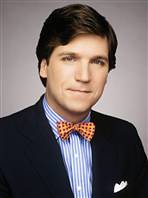
The recent "interview" of Robert Bork by our bow-tied Tucker Carlson was a joy to behold. Besides the uneasy image I had reading the transcript of two dogs smelling each other, I found it amazing that Bork was willing to say, in effect, that his main objection to Ms. Miers appointment was that she may carry with her to the court a somewhat open mind. Interpret for yourself:
The interview also had a wonderful little moment provided by Mr. Carlson.
Listen up Tucker. If you were not white and male - like most of our Supreme Court justices have been and are - you just might find it easier to understand.
These guys can't be as thick as they appear. Or can they?

But I was just blown away by his choice of Harriet Miers as the next Supreme Court justice. I really don't know whether to laugh or cry. With one announcement he has managed to confound his friends and foes alike, and expose at the worst possible time his consistent lack of sound judgment and personal integrity. I almost feel sorry for the guy. Almost.
More than for him I feel for Ms. Miers. Minimally qualified, except through her devotion to a man who became President, it must be very painful to have to endure the hostile scrutiny of practically everyone with her main defenders all working at one address. With friends like the President's "conservative" supporters, she does not need enemies. She may well be a great person, smarter and more hard working than most. But she has fallen in with thieves. It is getting personally ugly, and may get more so.
Almost as informative and amusing has been the roiling about of the more reactionary elements of our political establishment, almost as entertaining as watching a dog chew on its own leg. Sometimes the best you can hope for is that these folks get the opportunity to really say what is on their minds, and that someone is listening.

The recent "interview" of Robert Bork by our bow-tied Tucker Carlson was a joy to behold. Besides the uneasy image I had reading the transcript of two dogs smelling each other, I found it amazing that Bork was willing to say, in effect, that his main objection to Ms. Miers appointment was that she may carry with her to the court a somewhat open mind. Interpret for yourself:
TUCKER CARLSON, MSNBC HOST: Are you impressed by the president's choice of Harriet Miers?So for Mr. Bork - shown here in a bow-tie of his own and thankfully still a private citizen - it is necessary to have developed a "constitutional philosophy" before considering the facts and context of a case brought before the court. And not just any constitutional philosophy will do. It should be one he agrees with. Lord help us if Harriet Miers ever gets a chance to vote based on something she might learn after taking a seat on the bench.
JUDGE ROBERT BORK, FORMER SUPREME COURT NOMINEE: Not a bit. I think it's a disaster on every level.
CARLSON: Why? Explain the levels on which it's a disaster.
BORK: Well, the first one is, that this is a woman who's undoubtedly as wonderful a person as they say she is, but so far as anyone can tell she has no experience with constitutional law whatever. Now it's a little late to develop a constitutional philosophy or begin to work it out when you're on the court already. So that - I'm afraid she's likely to be influenced by factors, such as personal sympathies and so forth, that she shouldn't be influenced by. I don't expect that she can be, as the president says, a great justice.
But the other level is more worrisome, in a way: it's kind of a slap in the face to the conservatives who've been building up a conservative legal movement for the last 20 years. There's all kinds of people, now, on the federal bench and some in the law schools who have worked out consistent philosophies of sticking with the original principles of the Constitution. And all of those people have been overlooked.
The interview also had a wonderful little moment provided by Mr. Carlson.
BORK: ... It's odd that Justice Roberts, who is now the chief justice, and who will probably be an excellent choice in many ways, also had no track record that was easy to follow.First he calls White House defenders - not supporters - of Miers "flacs." Then he damns them with faint praise by describing them as "decent people." Finally he does not quite understand why diversity of experience or her gender might be important on the Supreme Court.
CARLSON: Yes.
BORK: Now this woman, who has even less of a track record.
CARLSON: None at all, it seems like. But her defenders' flaks from the White House, some of whom we've had on the show.
BORK: Flaks, eh?
CARLSON: Flaks, you know, professional spinners.
BORK: I know the word, I just was interested in this. Go ahead.
CARLSON: Yeah, that's essentially what they are some decent people, but repeating a line that's been devised by the PR office of the White House - claim that she is a great pick because she brings diversity of experience. Not only is she a woman, and that supposedly - for reasons I don't quite understand - is very important, but beyond that, she has followed a different path than most Supreme Court nominees. She hasn't been a judge, et cetera.
Listen up Tucker. If you were not white and male - like most of our Supreme Court justices have been and are - you just might find it easier to understand.
These guys can't be as thick as they appear. Or can they?
Wednesday, October 12, 2005
Shakori Hills
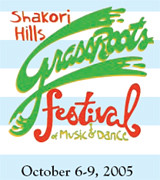 Last weekend was another adventure in music and camping as we attended the Grassroots Festival of Music and Dance, better known by the site name, Shakori Hills Farm. The music and rain were outstanding.
Last weekend was another adventure in music and camping as we attended the Grassroots Festival of Music and Dance, better known by the site name, Shakori Hills Farm. The music and rain were outstanding.Note to self: When pitching a tent on an incline in the rain, do not extend the plastic ground cover six inches outside the tent on the uphill side.The festival program describes the event as a "music lovers paradise," listing rootsrock, country, zydeco, latin, african, bluegrass, oldtime, gospel, blues and reggae as the music to be heard. They did not exaggerate; all were there. There was even a swing band in the dance tent Saturday night.
Only in its third year, the festival is smaller and more intimate than LEAF or Floydfest.
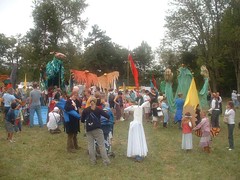 Yet it was smoothly organized, at least to this observer. There were no alcohol sales on site which probably contributed to the mellowness. And, like the others, the event is very child friendly, which again contributed to the sense of family and community. The photo above is of the beginning of the children's parade on Sunday.
Yet it was smoothly organized, at least to this observer. There were no alcohol sales on site which probably contributed to the mellowness. And, like the others, the event is very child friendly, which again contributed to the sense of family and community. The photo above is of the beginning of the children's parade on Sunday.The food vendors were outstanding. And located in the middle of Chatham County near the North Carolina Triangle, the festival is convenient for daytrippers.
Several of my favorite performers who I had seen recently were there: Donna the Buffalo, Railroad Earth, The Duhks, and Kellin Watson. But the best part of any weekend like this is stumbling across people I had never heard of playing great music. I spent most of the time with a smile on my face, just drifting from stage to stage when something caught my ear.

Once again Miss Rachel won the outstanding camper award.
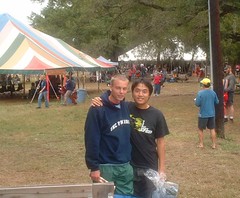 But the competition was close as Tobias and Michael, students from Sweden and Taiwan, who are spending a year at my wife's university, adapted smoothly to the many new sights and sounds - as well as a soggy tent Friday night.
But the competition was close as Tobias and Michael, students from Sweden and Taiwan, who are spending a year at my wife's university, adapted smoothly to the many new sights and sounds - as well as a soggy tent Friday night.In short, it was a great weekend. And the rain? No Problem!
Friday, October 07, 2005
The World Book
 I can still remember that morning when I was nine. Mr. Spangler, our local World Book Encyclopedia salesman, sat on our front porch and sold my mother this 1955 edition. I remember the smell of the samples, the colors of the different bindings, the salesman's pitch about the positive influence on my education, and mother signing on the dotted line for the installment plan. It was the summer before I was to start the fourth grade, and the beginning of the end of my childhood.
Mother told daddy after the fact that evening. I remember him being mildly annoyed about not being consulted. But if he had any real objections they did not keep the boxed volumes from arriving a few weeks later. I was so excited. I remember helping open the boxes, putting them in order, and carefully looking through each one.
I had always been a reader. In my school library in the Childhood of Famous Americans series published by Bobbs-Merrill with the orange - and sometimes blue - covers were my favorites. But this was different. This was grown up stuff.
It didn't happen all at once - the World Book initially was a bit over my head - but within a couple of years I would often pick up a volume and keep turning pages until something caught my fancy. I would read until satisfied and repeat the process. By this time my father had built an addition to our house which included the bookcase where they still reside and the window seat below where I would read for hours on end. Mother complained that I would rather read than eat.
Initially it would have been hard to credit my academic success to the World Book, for I had little. I was an indifferent student by the time I reached high school, a worse one by the time I finished. I was bright enough, my teachers said. But I did not apply myself. True. The classroom seem small to me by then; my attention was easily diverted. I was more interested in sports, cars, and that rock and roll on the AM radio. And I did not know it then, but the 60's were coming to get me.
But I had developed on that window seat with those red World Book's a love of reading, the printed word, and learning. Those loves would later form the foundation of my better-late-than-never attempts to educate myself, with - or in spite of - the assistance of institutions of higher learning.
I have often wondered what would have happened to me if my mother had not signed on those dotted lines that summer morning.
I can still remember that morning when I was nine. Mr. Spangler, our local World Book Encyclopedia salesman, sat on our front porch and sold my mother this 1955 edition. I remember the smell of the samples, the colors of the different bindings, the salesman's pitch about the positive influence on my education, and mother signing on the dotted line for the installment plan. It was the summer before I was to start the fourth grade, and the beginning of the end of my childhood.
Mother told daddy after the fact that evening. I remember him being mildly annoyed about not being consulted. But if he had any real objections they did not keep the boxed volumes from arriving a few weeks later. I was so excited. I remember helping open the boxes, putting them in order, and carefully looking through each one.
I had always been a reader. In my school library in the Childhood of Famous Americans series published by Bobbs-Merrill with the orange - and sometimes blue - covers were my favorites. But this was different. This was grown up stuff.
It didn't happen all at once - the World Book initially was a bit over my head - but within a couple of years I would often pick up a volume and keep turning pages until something caught my fancy. I would read until satisfied and repeat the process. By this time my father had built an addition to our house which included the bookcase where they still reside and the window seat below where I would read for hours on end. Mother complained that I would rather read than eat.
Initially it would have been hard to credit my academic success to the World Book, for I had little. I was an indifferent student by the time I reached high school, a worse one by the time I finished. I was bright enough, my teachers said. But I did not apply myself. True. The classroom seem small to me by then; my attention was easily diverted. I was more interested in sports, cars, and that rock and roll on the AM radio. And I did not know it then, but the 60's were coming to get me.
But I had developed on that window seat with those red World Book's a love of reading, the printed word, and learning. Those loves would later form the foundation of my better-late-than-never attempts to educate myself, with - or in spite of - the assistance of institutions of higher learning.
I have often wondered what would have happened to me if my mother had not signed on those dotted lines that summer morning.
Wednesday, October 05, 2005
the subdudes
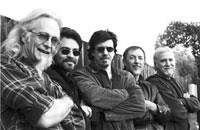 Over the weekend my wife and I were back in Charlotte at the Neighborhood Theatre to hear the subdudes. It was my first time hearing them live after owning all of their albums since they formed in 1987. Maybe it was the Low Country Shrimp and Grits at Boudreaux's Louisiana Kitchen next door before the concert - or the beer - but I would rank their performance last Saturday night in my personal all-time top 10. And I have heard a lot of live music over the years. Damn, they were good.
Over the weekend my wife and I were back in Charlotte at the Neighborhood Theatre to hear the subdudes. It was my first time hearing them live after owning all of their albums since they formed in 1987. Maybe it was the Low Country Shrimp and Grits at Boudreaux's Louisiana Kitchen next door before the concert - or the beer - but I would rank their performance last Saturday night in my personal all-time top 10. And I have heard a lot of live music over the years. Damn, they were good.I know this is beginning to sound like a broken record. (does anyone reading this have any idea what a broken record might sound like?) Like most of my favorites, the subdudes don't sound like anyone else. With a core instrumentation of guitar, accordion and tambourine, years of living and playing in the New Orleans area, and a sitting on the front porch Sunday afternoon sensibility - subdued - their music defies a clear label. All I know is I love it.
It sounds like an old story. A group of veteran musicians gets together for a one-night jam almost on a whim. Something clicks; they like it. They play some more, take a name and build a following. They tour, make CDs and tour some more. But critical praise and a small but loyal fan base barely pays the bills. And the road weary band plays a farewell gig ten years later where they started. The place? The legendary Tipitina's in N.O. The band? Our subdudes.
But wait, there is more. The musicians continue to work. Five years later two ex-subdudes invite another ex-subdude up on stage for a song or two. The crowd goes wild. Discussions are held, bands merge. The 'dudes (three of four) are back - older, wiser, and with more musical ideas to share. Life is good.
That was 2001. Fast forward to August 2005. Hurricane Katrina hits southeastern Louisiana, hard. The homes of the guitar and bass player are severely damaged. They and their families evacuate before the storm and are safe, but now live with family and friends. Several gigs are cancelled or rescheduled but they come to Charlotte October first and just play their asses off. The photo below from the show does not begin to capture the energy.
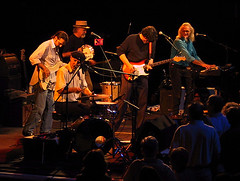
Very few musicians live well. Even the very best, the most dedicated at their craft and to the enjoyment of their audiences, frequently have trouble making ends meet. Sometimes they are their own worst enemy. Other times the guys with the suits rob them blind. In any case it does not take much sometimes to tip them over the financial edge. For many musicians Katrina was sufficient.
Along with the usual messages in the forum section of the subdudes' website recently was a post from the band's management forthrightly acknowledging that the band and its members and families are hurting financially. They are now considering playing at private parties as part of their touring. For musicians of this quality to be willing to play in living rooms says a great deal to me about their dedication and their need. They have gone so far as to establish a relief fund so their fans have a way to help out. And they are far from alone. A quick look at the Tipitina's Foundation website paints the larger picture.

So if you have the opportunity and connections, inquire about bringing the subdudes to a venue near you. Contribute what you can in relief of all the musicians who bring so much happiness to the world. Support live music, as I will be doing this weekend.
And check out the subdudes. What the Neighborhood Theatre wrote on its poster might be true, quite possibly the best band, ever.
Sunday, October 02, 2005
Influenza
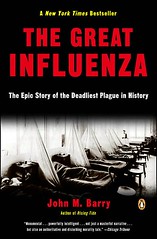 Last year John M. Barry, author of Rising Tide, published his latest, The Great Influenza - The Epic Story of the Deadliest Plague in History. I just finished it. According to the White House it was one of three books G.W. Bush took with him to read on his hurricane shortened August vacation. I wonder if he did.
Last year John M. Barry, author of Rising Tide, published his latest, The Great Influenza - The Epic Story of the Deadliest Plague in History. I just finished it. According to the White House it was one of three books G.W. Bush took with him to read on his hurricane shortened August vacation. I wonder if he did.While scientists are now arguing in public about just how many people may die in the next pandemic coming to a neighborhood near you, I found the book fascinating for two reasons unrelated to the influenza virus itself and the untold millions (50? 100?) who died.
First was his opening description of the abysmal state of American medical education and practice in the mid and late 1800's and those who, by the time the pandemic occurred, made the best of American medical practice the equal of any in the world.
The second was the governmental and institutional response to the rapid spread of the disease and deaths. Given that the cause was unknown (most thought it was a bacteria) and no cure was available (there still isn't), maybe we should cut the elected officials, medical establishment, print media, government officials some slack. However the repeated poor coordination among governmental agencies, failure to heed professional warnings, and willingness to lie to the public during a time of crisis cost many citizens their lives. Does this sound familiar? There was a war on then too.
Turns out historian John Barry lives in New Orleans (Tulane & Xavier Universities). Seems like instead of having to research trouble, this time trouble came looking for him. You can read more about and by Mr. Barry at the excellent History News Network web site.
That individuals act badly in times of crisis should not surprise us. Fear and ignorance are not pretty, a bad combination. And since mankind is constantly turning over we can't count on individual experience for much. But institutions are different. They were created to express the best of our collective knowledge and wisdom. They were created to pass knowledge across the generations. That the institutions we depend on can so easily fail, repeating the mistakes of the past - in 1918, 1927, as illustrated by Barry, and before our eyes in August 2005 - should be sobering for all of us.
Subscribe to:
Comments (Atom)
